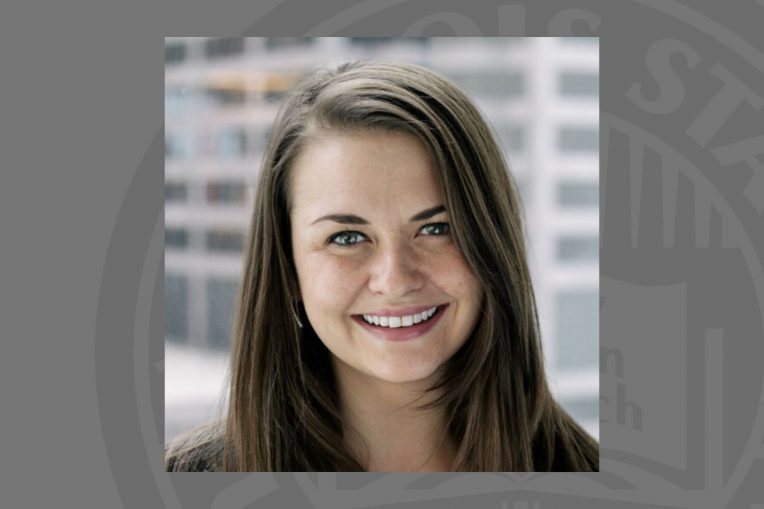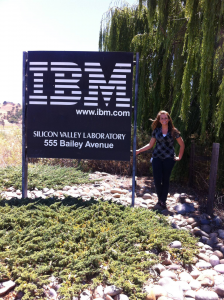Ameliah Tawlks ’12, M.A. ’15 is an Illinois State University alumna of the Department of English who spent her undergraduate career in the publishing studies program with internships as a production assistant for the Publications Unit and as a technical writer for the resource portal, My.IllinoisState.edu. She also served as an active member of the Sigma Tau Delta Honors Society. Tawlks went on to earn her Master of Arts in professional writing and rhetorics with an internship as an information developer for the IBM Silicon Valley Lab.
Tawlks went on to build a career that brought her interests in business and technical communication together through project management. She now works as a product strategy principal at NAUTIC-ON, a Brunswick Corporation brand, where she manages and collaborates with cross-functional teams to build strategies for their smart boat monitoring application, which allows users to remotely check on their boat’s diagnostics. Tawlks has used her undergraduate and graduate studies to help her navigate a highly technical field with a humanities-based approach, giving her a unique look into how the publishing studies sequence can prepare students for careers in a variety of different fields.
In this Q&A, Tawlks spoke about her time studying at Illinois State and how her experiences in the publishing sequence led her to build the career she has established today.
What sparked your interest in publishing and brought you to the publishing studies program here at Illinois State?
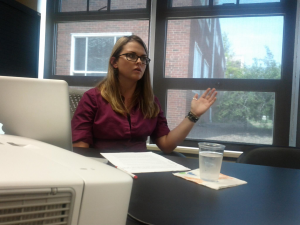
I came into Illinois State as an English education major. To be honest, I had no idea what I wanted to do with my life as an 18-year-old entering college. I knew I loved to read, and to have deep discussions, and to interrogate the more complex points of life. There didn’t seem to be a major that fit my life path, so I thought: ‘I’ll teach English. I’d be good at that.’ (Even though I really can’t handle children in any capacity!)
I quickly made connections in the department and found out about the publishing studies program, and it was like a whole new world opened up to me. I have a working-class background and didn’t have scope to understand I could spend my life working with words prior to working with professors and my advisor. Publishing studies helped me find my tribe and made me realize I could find true fulfillment in my work.
What skills and experiences from Illinois State were most helpful to you when you entered the job market?
Understanding that education and experience are not a one-to-one connection to the work you end up doing. I learned that the most valuable skill is adaptability—being able to take larger concepts and apply them to specific situations is so much more valuable than being an expert in a tool or in a particular field. Figuring out, with help, how to present myself as valuable in any situation. Finding confidence in myself as I progressed through the program and took bits and pieces of advice and skills from everyone I met.
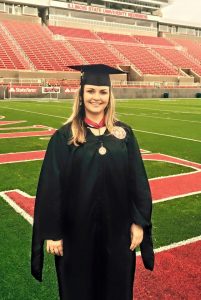
Based on your experiences in your professional career, what are your thoughts on whether publishing studies students should consider pursuing a master’s degree?
If you have the time and the funding, I can’t recommend enough going on to a master’s program. The conversations I had in my master’s changed my entire life—I learned to look under the surface of what I was taught to find context and trajectory. I found my voice. I learned about the more difficult parts of our past as humans, and how even in a technical role, I can help to stop their repetition. Most important, I found confidence through the high expectations put upon me from the faculty.
That being said, there are many experiences that can be found and could be more beneficial to a student by going directly to the job market. I’d recommend speaking with trusted advisors and folks in the field you’d like to pursue while making your decision. I’d also highly recommend following your heart and your gut and prioritizing this time as a time for you to grow into who you’d like to become.
In what ways has your background in publishing, and the humanities more broadly, helped you to navigate the technical environments you work in?
I think that we need way more humanities folks in tech. Developers, engineers, and technical people are essential—but so is the human side. My ability to make broad connections and mind small details while still keeping in mind how a user is impacted allows me to create and influence online experiences that don’t reach out to an unknown person. I think about their background, their demographics, how they feel that day, how the world is impacting them. I’m able to consider the ethics of a tool that my teams create—not just how it will influence the business. My speaking and presentation skills developed through the program are an enormous asset. Professors didn’t just look at how I held myself, but why I chose to speak to the topics I presented. There was always an element of digging deeper—why do you feel this way, why is something assumed to be the way it is? I learned how to locate myself and others within large systems, and it serves me every day.
How did you get started at your current position at NAUTIC-ON?
I worked with an outside digital agency, Solstice, for a project at a previous role with COUNTRY Financial. Some of the folks at the agency remembered me when it came time for them to end a project with Brunswick, and they recommended me to Brunswick to take up a permanent position. Being recruited to Brunswick reminded and solidified for me just how important it is to maintain connections and do your best, even for short projects and engagements. It had been years since I worked with Solstice, but my time spent there was enough for them to recommend me, and it turned into a really great job.
What is most rewarding about your career in project management, and how would you like to see your career grow?
Being a project manager is really in service of others. You lift folks up. You know their dogs’ and kids’ names. You know what makes them tick. You look out for them like they are your friends and family. I like to help and see people succeed, and I’m given that opportunity on both a large and small scale.
Walk us through your typical workday as a project manager. What skills have been most valuable to you in your everyday work?
I lead between two to five meetings each day. It’s my job to get the right people in the room, to get them to bring their knowledge to the table, to timebox and guide discussions. I have back-channel conversations to move things forward. I document everything. I send a lot of emails.
Mostly, I genuinely listen. It’s my job to know who people are and how they can best contribute to a project. It’s also my job to continuously take feedback without getting personally offended and to incorporate best practices that serve everyone in the most utilitarian manner possible.
How have you had to adapt in your position during the pandemic, and do you see any lasting impacts on your career as a result?
I’ve had to learn how to create intrinsic motivation. I’m someone who is motivated by deadlines and by accolade. When you’re at home, it’s easy to slip into not doing your best, but this impacts other people in their own positions.
I’ve had to find ways to keep the human element alive—digital happy hours, setting up retrospective self-examination meetings that get to the heart of issues. I’ve had to work through sadness and pain and unpredictability (the same as we all have) but also evolve to find new ways to motivate others, even when I myself am not motivated.
For me, what I’ll take out of the pandemic is patience. Holding on for just one more day in hopes that things will get better. Not taking what happened at work that day as the final outcome. Realizing that I am not perfect and need to give myself the same grace I give others. I’m also much more mindful of how at-home experiences impact someone’s performance at work.
What was the biggest hurdle you faced transitioning from your undergraduate studies to a career in project management, and how did you overcome it?
I think the biggest struggle for me was learning how to play office politics and deal with “real life.” It can be difficult to come to grips with the fact that getting a job done is not a 1 + 1 = 2 equation where being prepared + working hard = a good end product. There are so many things at play—personality conflicts, power struggles, the impact that life in general outside of work has on how people operate at work. … It all adds up to being so much more complex than turning your work in and being evaluated based on your output.
Overcoming this has been a long road. I think I started achieving success when I realized it was not something I could accomplish quickly. I started: being more vulnerable with my questions to folks I trusted on my team; asking how to better my soft skills and how to handle situations; being very, very cognizant of the language and tone I use; picking my battles; and having empathy but also standing up for my team and my projects.
What final advice do you have for current publishing studies students as they prepare to enter the job market? Is there anything you wish you knew?
Stay enthusiastic. Do whatever you need to maintain a spark of curiosity. Get involved. Don’t take on more than you can chew—being able to delegate and set up boundaries is an enormous skill. Working 60 hours a week is not a flex—don’t think that signing yourself up to be overworked is success. Ask people to lunch. Don’t change who you are—play to your own strengths. You don’t have to fit a mold to be valuable. Ask for insight from people you admire.
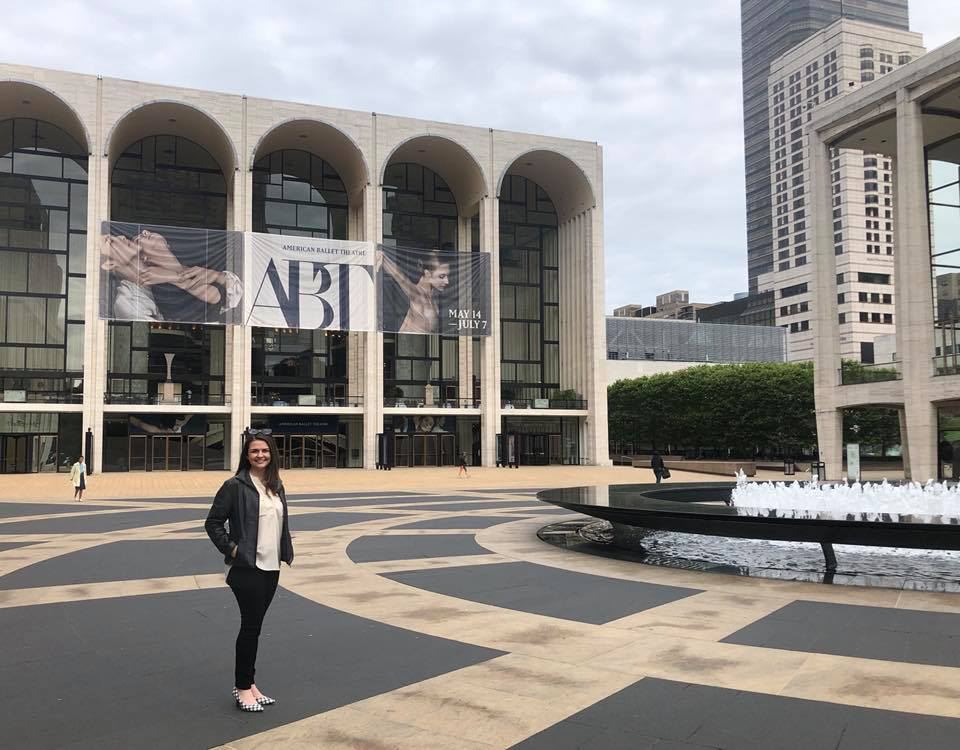
About the Author: Sarah Urban is an undergraduate at Illinois State University, studying English in the publishing studies sequence with a minor in business administration. She is currently interning as a production assistant at the Publications Unit. In her free time, you can find Sarah curled up with her dog reading a good book or feeding her Netflix addiction.
Find additional information here about the publishing studies sequence and internship and assistantship student opportunities at the Publications Unit or contact Steve Halle, director of the Publications Unit, at cshalle@IllinoisState.edu or 309-438-7481. Follow the Publications Unit on Twitter @PubUnit_ISU and on Instagram @PubUnit.
